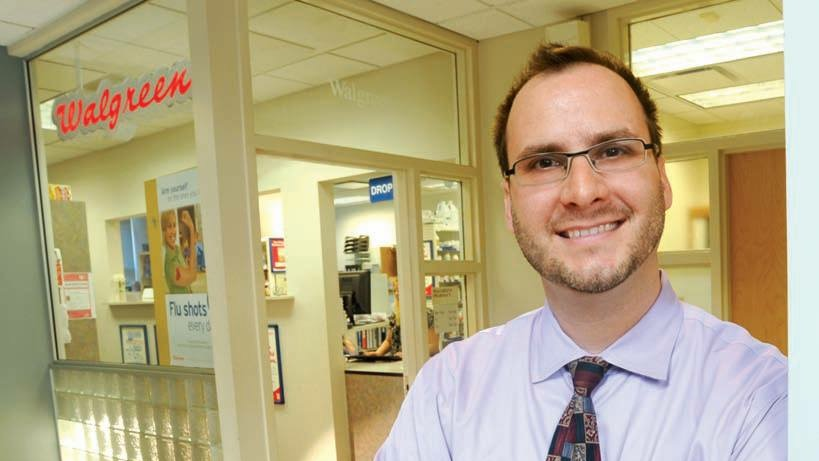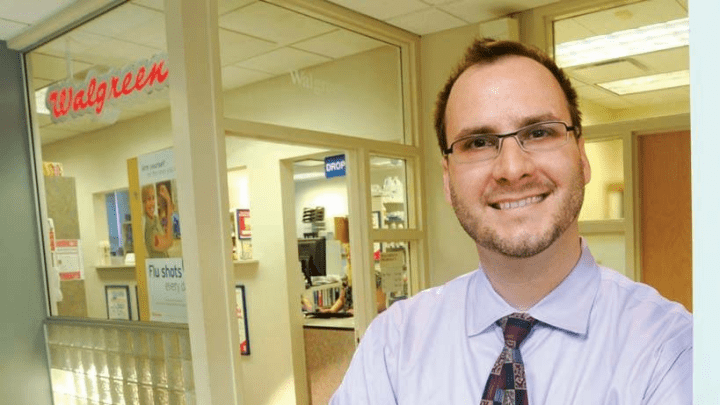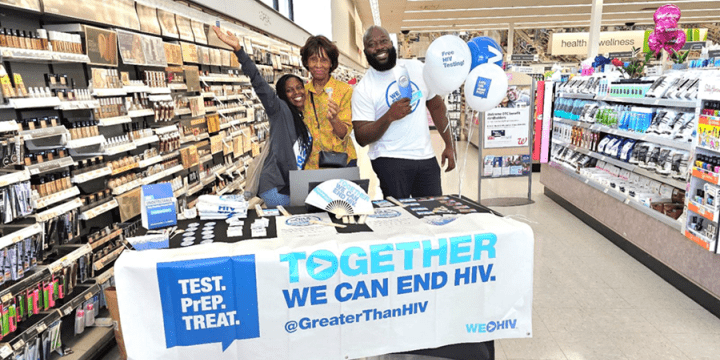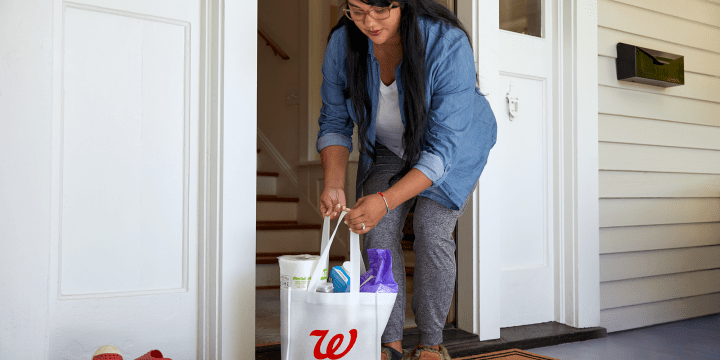When Drew Halbur was job-hunting fresh out of pharmacy school and learned that Walgreens had opened a location inside of a clinic caring for patients with HIV—the first such onsite pharmacy for Walgreens—it became his main reason for joining the company.
Now, more than 20 years later, every day still feels like a new adventure as he continues to serve LGBTQ+ patients at that same organization as pharmacy manager of the Walgreens Community Pharmacy at Howard Brown Health’s Clark Street location in Chicago. Howard Brown Health has grown into 8 locations serving more than 38,000 adults and youths a year, providing expert care to the LGBTQ+ community and allies.
“For Walgreens to be willing to be part of that space, to advocate for and support those patients at what was close to the height of the AIDS epidemic, was important to me,” says Halbur.
That advocacy and support continues today as Walgreens acts as a founding member of the U.S. Business Action to End HIV coalition and offers broad HIV care and services including free same-day delivery of medications for the prevention and treatment of HIV in select areas, as well as participates in National HIV Testing Day. Howard Brown Health is a testing partner for this year’s National HIV Testing Day on June 27, and you can find a list of testing locations here.
Additionally, all Walgreens pharmacists receive HIV prevention and stigma training, and approximately 3,000 specialty and retail pharmacists have undergone in-depth training around HIV treatment and prevention.
At the time Halbur joined Walgreens, the onsite specialty pharmacy model was a pilot program. Now Walgreens has more than 300 specialty pharmacies across the country, including three connected to Howard Brown Health locations. As services grew, the community's healthcare needs changed, too, with Howard Brown Health and many clinics like it now operating as primary care clinics, not just for HIV treatment and prevention and sexual health.
Game-changing partnership
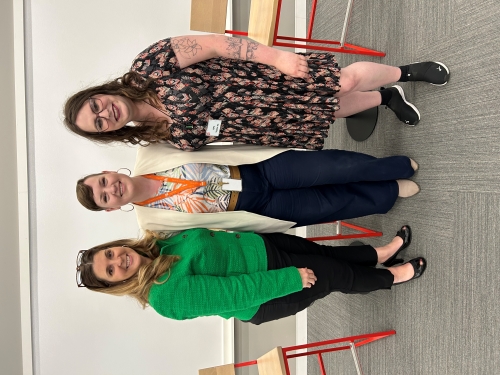
This Pride Month, to examine this evolution and highlight the 27-year partnership between Walgreens and Howard Brown Health, the Walgreens Pride Alliance employee-led business resource group hosted a fireside chat on its campus headquarters in Deerfield, Illinois, with Katie Metos, vice president of external relations at Howard Brown Health, and Angela Bower, senior director of clinical advocacy at Walgreens. Violet Hunter, reporting analyst and Pride Alliance co-chair, moderated the discussion.
“At the beginning of our partnership, having a co-location with Walgreens was a game-changer for us because it meant our patients were able to access pharmacy care without stigma or discrimination,” says Metos. “Together we created a space for LGBTQ+ people to feel seen and become healthy.”
For Walgreens, choosing the right community partners has also been critical to success.
“We look for organizations like Howard Brown where we can provide holistic care to patients while really understanding and addressing their unique needs,” says Bower.
Why LGBTQ+ focused primary care works
When patients feel comfortable being their whole selves with their healthcare providers, it makes it easier to ask questions; discuss risks, interactions and preventive care; and work on your health goals together, according to Bower. The impact goes far beyond sexual health to promote a healthier community overall.
“If you're a lesbian who's less likely to go get a mammogram because you’re worried about being judged by the provider, then you're less likely to get diagnosed with breast cancer early and get treatment,” says Metos. “We’re committed to creating safe spaces and safe partnerships for people to be able to receive care, whether they need their ADHD medications or they need chronic care medication for a failing liver.”
For patients with HIV, the primary care model also serves them well.
“HIV care has changed quite dramatically over the years, it’s getting simpler and there are less medication side effects or interactions,” says Halbur. “Now we also focus on how living with HIV impacts the primary care we can provide, like screening for diabetes or chronic inflammatory conditions for those patients.”
In addition to being a certified HIV pharmacist through the American Academy of HIV Medicine, Halbur became a board-certified ambulatory care pharmacist, which advances his knowledge and experience to optimize therapy for patients in collaboration with primary care providers to provide integrated, accessible healthcare services for patients with chronic conditions.
Ensuring access to quality care and equitable treatment
At Howard Brown Health, around 20% of the patients identify as transgender or gender non-conforming, according to Metos. Providing proper care to every patient, regardless of gender identity or sexual orientation, is a priority for both Walgreens and Howard Brown Health, with Bower and Metos each emphasizing the ongoing training and education for their teams on delivering culturally competent care.
Using a patient’s correct pronouns is just the start. Howard Brown Health offers services for gender-affirming care from a medical and behavioral health perspective, and Walgreens provides its specialty pharmacy services through the co-location. Being attuned to the specific needs of patients on hormones, such as interactions with other common medicines or long-term impacts, is part of that holistic care, according to Metos.
Another barrier to quality care for the LGBTQ+ community can be financial. The Walgreens team at the Howard Brown Health locations includes a specialty billing technician that focuses on finding financial assistance options for patients so they can adhere to their treatments.
“Whether through co-pay cards, foundation grants, or federal or state patient assistance programs, the billing technicians help get medications covered or make them significantly more affordable,” says Halbur. “By working very closely with patients, they make sure we're using every available resource so the patient can stay on therapy and in care as much as possible.”
Howard Brown Health locations also feature a variety of other partnerships that work in tandem to address other barriers to health, like access to nutritious food, transportation, social services and community.
“We’re a healthcare organization, and there are many things we are not, but what we can do is find partners who can support our patients in accessing what they most need in order to feel most human,” says Metos. “Partners like Walgreens understand that it’s not just ‘here’s your prescription,’ it’s holistic care so that we as a community can continue on that road to better health.”
